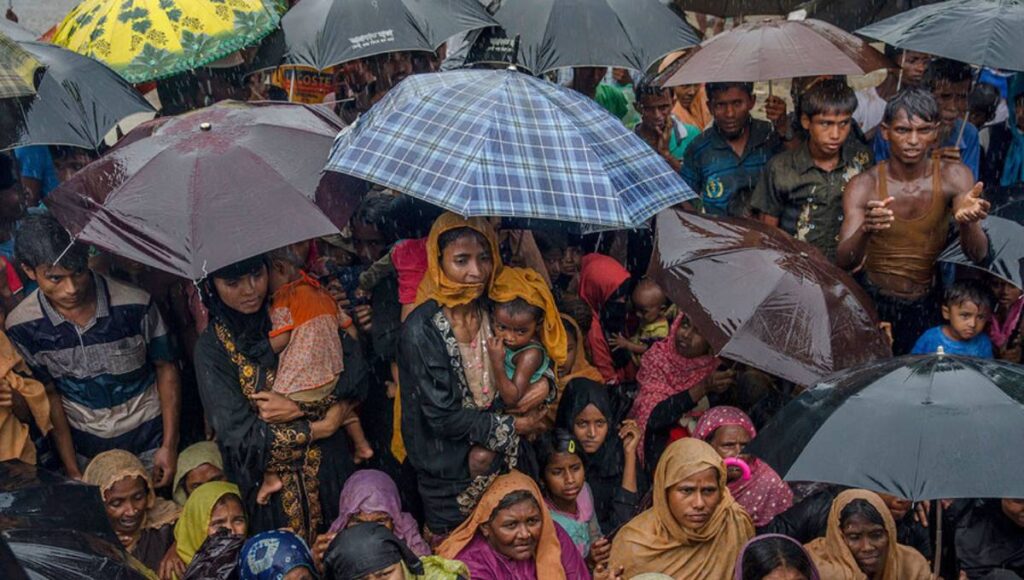Dhaka, May 22 : Efforts are underway to resume tripartite talks among Bangladesh, China and Myanmar on Rohingya repatriation even though the negotiation with Myanmar remains halted for a long time due to the Covid situation and subsequent military coup in Myanmar. Considering the repatriation that took place in 1978 and 1992 (under military government), Bangladesh remains “hopeful” about the repatriation of Rohingyas to their place of origin in Rakhine State despite the fact that a military government is in place, officials said.
Chinese State Councilor and Foreign Minister Wang Yi had a phone conversation with Foreign Minister Dr AK Abdul Momen on Friday evening and he “assured us of taking an initiative” to resume tripartite talks – among Bangladesh, Myanmar and China- for the repatriation of Rohingya.
The Chinese Foreign Minister reiterated his government’s commitment regarding the Rohingya repatriation, according to the Ministry of Foreign Affairs here.
The last tripartite meeting was held in January this year when Bangladesh pushed Myanmar hard on creating a favourable environment for the repatriation with an expeditious verification process.
Bangladesh had handed over a list of 840,000 Rohingyas to Myanmar for verification but the verification process by the Myanmar side was very slow, Dhaka says.
The talks on Rohingya repatriation got halted as the military got back taking over the charge and declared a year-long state of emergency. It seized control on February 1 following a general election which Aung Aung Suu Kyi’s NLD party won by a landslide.
“History tells us that Myanmar took back its citizens with dignity based on voluntary decisions in 1978 and 1992. We’re hopeful that Rohingyas will go back to Myanmar voluntarily with dignity,” Foreign Minister Dr AK Abdul Momen told UNB.
He said Myanmar had been under military rule in the past too but Rohingyas were tortured during the democratic regime under Aung Sung Suu Kyi.
Dr Momen said Bangladesh highlighted three issues after the military coup in Myanmar — Bangladesh wants democracy to flourish everywhere, wants peace instead of conflicts and Bangladesh expects that Myanmar will take back its citizens on a priority basis.
Just before the launching of the 2021 Joint Response Plan (JRP) recently, State Minister for Foreign Affairs M Shahriar Alam said Bangladesh has been able to establish two things in the JRP – focus on Rohingya repatriation as a solution and making sure that Rohingya relocation to Bhasan Char is a temporary arrangement until the repatriation takes place.
“We could reestablish two things in this JRP – one is repatriation and another is we didn’t allow it (Bhasan Char) to become a permanent mechanism,” he told a small group of journalists, including the UNB correspondent, at his office.
Shahriar said Bangladesh is focusing on repatriation, and Bhasan Char is a temporary arrangement though many had tried to make it a permanent mechanism.
Earlier, repatriation attempts failed twice in November 2018 and August 2019 amid Rohingyas’ lack of trust in the Myanmar government.
Bangladesh is now hosting over 1.1 million Rohingyas in Cox’s Bazar district and Bhasan Char.
Sanctions
Tom Andrews, the UN Special Rapporteur on the situation of human rights in Myanmar, has welcomed the announcement of a new set of government sanctions against Myanmar’s junta by the United States, the United Kingdom and Canada, highlighting in particular the US designation of the junta itself, or the State Administrative Council (SAC) for sanctions.
“It’s imperative that the international community ramp up the size and scope of sanctions as the junta ramps up its repression on the people of Myanmar,” said Andrews.
He said the United States has taken one of the most significant steps to date against the Myanmar junta, first by sanctioning not only individuals but the State Administrative Council itself; and second, by opening the door to targeting those who continue to do business with the junta and therefore aid and abet their relentless attacks against the people of Myanmar.
“The designation of the SAC strikes a new blow to the junta’s finances. It is a significant step in the right direction.”
“This is a warning to all those who are willing to conduct business as usual with the junta,” Andrews said. “Those who continue to aid and abet this murderous enterprise — be they international businesses, banks, arms traffickers, or government entities providing financial, technological or other support — are now on notice that they themselves could face sanctions.
Andrews also welcomed the new sanctions imposed on Monday by the United Kingdom and Canada, including sanctions targeting the junta’s profiting from the timber and gems trade.
Andrews said, however, that more must be done, and done quickly.
Andrews also urged countries that have yet to impose sanctions on Myanmar to take action. “I urge those countries that have yet to impose costs on the junta for its illegal coup and its systematic atrocities and human rights violations to reconsider. Now is the time to step up,”reports UNB.




